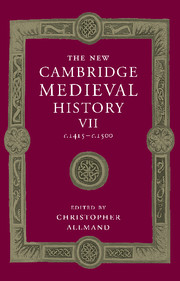Book contents
- Frontmatter
- PART I GOVERNMENT
- PART II ECONOMIC AND SOCIAL DEVELOPMENTS
- PART III SPIRITUAL, CULTURAL AND ARTISTIC LIFE
- PART IV THE DEVELOPMENT OF EUROPEAN STATES
- 17 Germany and the Empire
- 18 Hus, the Hussites and Bohemia
- 19 France
- 20 Burgundy
- 21 England
- 22 The Celtic world
- 23 Italy
- 24 The Iberian peninsula
- 25 The Swiss Confederation
- 26 The States of Scandinavia, c. 1390– c. 1536
- 27 Hungary: Crown and Estates
- 28 The Kingdom of Poland and the Grand Duchy of Lithuania, 1370–1506
- 29 Russia
- 30 Byzantium: The Roman Orthodox World, 1393–1492
- 31 The Latin East
- 32 The Ottoman World
- 33 Conclusion
- Appendix Genealogical Tables
- Primary Sources and Secondary Works Arranged by Chapter
- Index
- Frontispiece
- Plate section
- Map 1 European towns in the late Middle Ages
- Map 2 European commerce and trade
- Map 4 Winds and currents facilitating the discoveries
- Map 5 The universities o f Europe in 1400 and 1500
- Map 6 Germany and the Empire
- Map 20 The Roman Orthodox and Ottoman worlds in the fifteenth century
- References
32 - The Ottoman World
from PART IV - THE DEVELOPMENT OF EUROPEAN STATES
Published online by Cambridge University Press: 28 March 2008
- Frontmatter
- PART I GOVERNMENT
- PART II ECONOMIC AND SOCIAL DEVELOPMENTS
- PART III SPIRITUAL, CULTURAL AND ARTISTIC LIFE
- PART IV THE DEVELOPMENT OF EUROPEAN STATES
- 17 Germany and the Empire
- 18 Hus, the Hussites and Bohemia
- 19 France
- 20 Burgundy
- 21 England
- 22 The Celtic world
- 23 Italy
- 24 The Iberian peninsula
- 25 The Swiss Confederation
- 26 The States of Scandinavia, c. 1390– c. 1536
- 27 Hungary: Crown and Estates
- 28 The Kingdom of Poland and the Grand Duchy of Lithuania, 1370–1506
- 29 Russia
- 30 Byzantium: The Roman Orthodox World, 1393–1492
- 31 The Latin East
- 32 The Ottoman World
- 33 Conclusion
- Appendix Genealogical Tables
- Primary Sources and Secondary Works Arranged by Chapter
- Index
- Frontispiece
- Plate section
- Map 1 European towns in the late Middle Ages
- Map 2 European commerce and trade
- Map 4 Winds and currents facilitating the discoveries
- Map 5 The universities o f Europe in 1400 and 1500
- Map 6 Germany and the Empire
- Map 20 The Roman Orthodox and Ottoman worlds in the fifteenth century
- References
Summary
the aftermarth of the battle of ankara
During the first half of the fifteenth century Europe, although shaken by the Great Schism and deeply divided by wars, had one obvious enemy: the Ottoman Turk, who professed a different religion and, for this reason, was not just an enemy but the enemy of Christ and of the Cross. This fact did not prevent a Christian state from pursuing commercial relations with the Turks, or even from appealing to them for help against another Christian state. However, in religious propaganda and political theory it was the Turk who was labelled as the eternal foe.
The process of Ottoman expansion was halted by the Anatolian campaign of the Mongol khan, Timur. The Christians had watched his movements with great interest at least since 1394, when his troops began to press the eastern frontier of the Ottoman lands. The whole Christian world felt deep relief when the Mongol army dissolved the Ottoman state by crushing Sultan Bayazid I’s troops near Ankara and taking him prisoner (1402). Timur, with his army, stayed in Anatolia for approximately one year after his victory.
Keywords
- Type
- Chapter
- Information
- The New Cambridge Medieval History , pp. 812 - 830Publisher: Cambridge University PressPrint publication year: 1998
References
- 1
- Cited by

